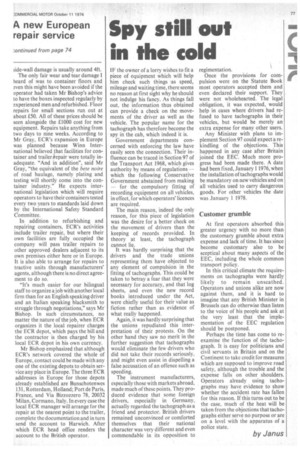Spy still out in the cold
Page 79

If you've noticed an error in this article please click here to report it so we can fix it.
IF the owner of a lorry wishes to fit a piece of equipment which will help him check such things as speed, mileage and waiting time, there seems no reason at first sight why he should not indulge his fancy. As things fall out, the information thus obtained can provide a check on the movements of the driver as well as the vehicle. The popular name for the tachograph has therefore become the spy in the cab, which indeed it is.
Government departments concerned with enforcing the law have easily seen the connection. Their influence can be traced in Section 97 of the Transport Act 1968, which gives authority by means of regulations — which the following Conservative Government abstained from making — for the compulsory fitting of recording equipment on all vehicles, in effect, for which operators' licences are required.
The main reason, indeed the only reason, for this piece of legislation was the desire for a better check on the movement of drivers than the keeping of records provided. In theory at least, the tachograph cannot lie.
It was hardly surprising that the drivers and the trade unions representing them have objected to any element of compulsion in the fitting of tachographs. This could be taken to betray a fear that they were necessary for accuracy, and that log sheets, and even the new record books introduced under the Act, were chiefly useful for their value as fiction rather than as evidence of what really happened.
Again, it was hardly surprising that the unions repudiated this interpretation of their protests. On the other hand they saw no merit in the further suggestion that tachographs would eliminate the few drivers who did not take their records seriously, and might even assist in dispelling a false accusation of an offence such as speeding.
The instrument manufacturers, especially those with markets abroad, made much of these points. They produced evidence that some foreign drivers, especially in Germany, actually regarded the tachograph as a friend and protector. British drivers remained unconvinced or comforted themselves that their national character was very different and even commendable in its opposition to regimentation.
Once the provisions for compulsion were on the Statute Book most operators accepted them and even declared their support. They were not wholehearted. The legal obligation, it was expected, would help in cases where drivers had refused to have tachographs in their vehicles, but would be merely an extra expense for many other users.
Any Minister with plans to implement Section 97 could expect a rekindling of the objections. This happened in any case after Britain joined the EEC. Much more progress had been made there. A date had been fixed, January 11976, when the installation of tachographs would be mandatory on new vehicles and on all vehicles used to carry dangerous goods. For other vehicles the date was January 11978.
Customer grumble
At first operators absorbed this greater urgency with no more than the customary grumble about extra expense and lack of time. It has since become customary also to be sceptical about many aspects of the EEC, including the whole common transport policy.
In this critical climate the requirements on tachographs were hardly likely to remain unscathed. Operators and unions alike are now against them, and it is hard to imagine that any British Minister in Brussels can do otherwise than listen to the voice of his people and ask at the very least that the implementation of the EEC regulation should be postponed.
Perhaps the time has come to reexamine the function of the tachograph. It is easy for politicians and civil servants in Britain and on the Continent to take credit for measures which are supposed to improve road safety, although the trouble and the expense falls on other shoulders. Operators already using tachographs may have evidence to show whether the accident rate has fallen for this reason. If this turns out to be the case, much of the heat will be taken from the objections that tachographs either serve no purpose or are on a level with the apparatus of a police state.
by Janus




























































































































































